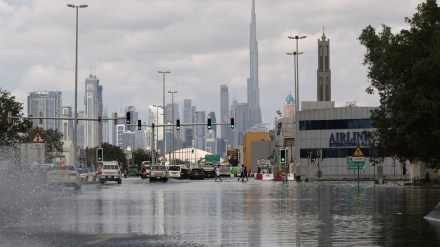UAE’s financial centre, Dubai, faced severe storm conditions last week as it received record-breaking rainfall causing a flood-like situation in the city. Conditions were so severe that numerous flights were diverted, delayed and cancelled as the airport was submerged in water while several people had left their cars stranded on flooded roads.
It is crucial to note that critical service facilities such as roads, bridges, and dams swiftly resumed operations, setting a precedent for prompt restoration.
Hassan Al Mansoori, the Undersecretary for Infrastructure and Transport Affairs at the Ministry of Energy and Infrastructure (MoEI), emphasized the UAE’s notable efficacy in addressing the repercussions of the recent extreme weather conditions.
He underscored the proactive and expeditious response of various concerned entities, attributing it to safeguarding lives, and properties, and accelerating recovery efforts.
UAE’s President Issues Directive – Details
Al Mansoori highlighted the directive issued by President His Highness Sheikh Mohamed bin Zayed Al Nahyan to assess the nation’s infrastructure status.
In adherence to this directive, MoEI collaborated with its partners to deploy a ground force tasked with assessing the damages inflicted by the intense rainfall. This initiative aims to conduct a comprehensive study on the necessity of expanding dams and waterways to better withstand future extreme weather occurrences.
Moreover, an integrated operational plan is in development to address the damage sustained by federal roads, ensuring the resilience of the rainwater drainage network. Proactive measures, including the maintenance of water pump stations along federal roads, are also slated for implementation.
The Ministry has devised comprehensive plans and strategies to ensure swift and effective emergency responses, prioritizing public safety and infrastructure protection. Multiple meetings were convened to establish immediate response protocols and prioritize actions. Seven field teams, in collaboration with private sector partners, were mobilized to promptly address emergencies on federal roads and dams. Efforts were made to regulate water levels by opening dam gates, thereby mitigating pressure and enhancing their capacity to accommodate increased rainfall.
Extensive technical assessments were conducted to evaluate the structural integrity of dam infrastructure, focusing particularly on drainage systems’ capacity to manage high water volumes. The Ministry undertook initiatives to clear waterways leading to dams and eliminate obstructions hindering water flow.
Al Mansoori highlighted the pivotal role of advanced technologies employed by the Roads Network Command and Control Center and in dam management, which significantly bolstered the effectiveness of implemented measures. Notably, the Roads Network Command and Control Centre effectively addressed obstruction reports on federal roads through coordinated efforts with field teams. Twenty teams were mobilized to alleviate accumulated rainwater and repair damages on federal roads.
Dubai’s drainage system – What do we know?
In recent years, there has been a notable increase in reports of rainwater infiltration into homes across the UAE during the rainy season, which typically spans from November to March. As a proactive measure, the UAE consistently undertakes upgrades to its drainage networks in anticipation of these annual weather patterns.
In June 2023, Dubai greenlit a comprehensive $21.8 billion sewerage system plan, championed by Sheikh Hamdan bin Mohammed bin Rashid Al Maktoum, Crown Prince of Dubai and chairman of the Executive Council. This ambitious initiative, beyond merely enhancing the drainage network, also prioritizes environmental sustainability objectives. Specifically, it aims to mitigate carbon emissions while embracing the principles of a circular economy for the management of resources in a sustainable manner.
Moreover, the approved sewerage system plan extends the operational lifespan of the infrastructure from 25 to 100 years. This extension is expected to yield improved operational efficiencies and ensure the long-term sustainability of the system, aligning with the UAE’s commitment to prudent resource management and environmental stewardship.
